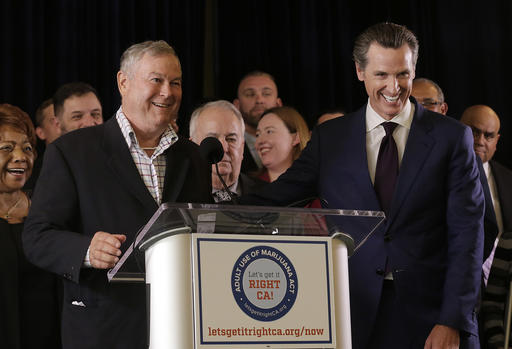SAN FRANCISCO (AP) — A long-anticipated campaign to legalize recreational marijuana use in the state that produces more pot than any other commenced in California on Wednesday as supporters announced they have collected enough signatures to qualify a voter initiative for the November ballot.
A well-funded and politically connected coalition spearheaded by former Facebook president Sean Parker said it has collected 600,000 signatures from registered voters — far more than the 365,000 needed — ahead of a July 5 deadline.
Stressing what promises to be a dominant message of the campaign, Lt. Gov. Gavin Newsom said the 62-page initiative will make it harder for people under 21 to obtain pot and easier for police to crack down on illicit sales than it has been in the two decades since California became the first U.S. state to legalize medical marijuana.
“You do not need to be pro-marijuana to be pro-legalization,” said Newson, the father of four young children who hopes to become governor in 2018. “We are not promoting something that is not already ubiquitous in the state of California.”
The measure, known as the Adult Use of Marijuana Act, would allow residents and visitors 21 and over to buy an ounce of marijuana and marijuana-infused products at licensed retail outlets and also grow up to six pot plants for personal recreational use.
Smoking weed would remain off-limits in places where tobacco use already is prohibited, including restaurants, bars and other enclosed public places.
The proposed law also would create what Newsom and other supporters said would be the nation’s strictest product quality and tracking system for either medical or recreational marijuana, with separate licenses required for growers, transporters and distributors.
Sales of both recreational pot and medical marijuana initially would be subject to a 15 percent excise tax. Cities and counties would retain the right to prohibit marijuana-related businesses and to impose their own fees and taxes.
State officials estimate the measure could net as much as $1 billion a year in new tax revenue for the state and local governments. Provisions of the initiative, which requires a simple majority vote to pass, would direct most proceeds to covering regulatory costs, research on the effects of legalization, environmental mitigation, substance abuse treatment and other purposes.
U.S. Rep. Dana Rohrabacher, a California Republican, offered a libertarian argument in favor of the measure on Wednesday, invoking the words President Ronald Reagan famously used to call for the dismantling of the Berlin wall.
“The walls of cannabis prohibition and tyranny are coming down,” said Rohrabacher, who worked in the Reagan White House. “Join us in tearing down this wall.”
The initiative already has been endorsed by the California NAACP, California Medical Association and California Democratic Party.
The California Republican Party voted to oppose the measure at its convention last month. On Wednesday, the California Police Chiefs Association, the California Hospital Association, the Teamsters Union and other groups also said they would be campaigning against it.
The initiative’s sponsors plan to promote legalization as a civil rights issue in the months ahead, arguing that minority communities suffer a disproportionate share of drug crimes and arrests.
“If an African-American wants to know what to do about some of the crime in the inner city, about some of the gang-bangers, they should get behind the Adult Use of Marijuana measure,” NAACP State President Alice Huffman said.
Campaign spokesman Jason Kinney would not say Wednesday how much initiative backers expect to spend to get it passed. With several deep-pocketed donors already on board, raising money should not be a problem for this campaign, he said.
For now, the campaign is operating with the slogan “Let’s Get It Right,” a reference both to California’s chaotic history with medical marijuana, the perception that legalization is inevitable and lessons to be had from the handful of states that already have legalized recreational use, Kinney said.
Recreational pot use already has been legalized in Alaska, Colorado, Washington and Oregon.
Initiatives allowing for casual use have qualified for November ballots in Nevada and Maine.
Copyright 2016 The Associated Press. All rights reserved. This material may not be published, broadcast, rewritten or redistributed.









.jpg)